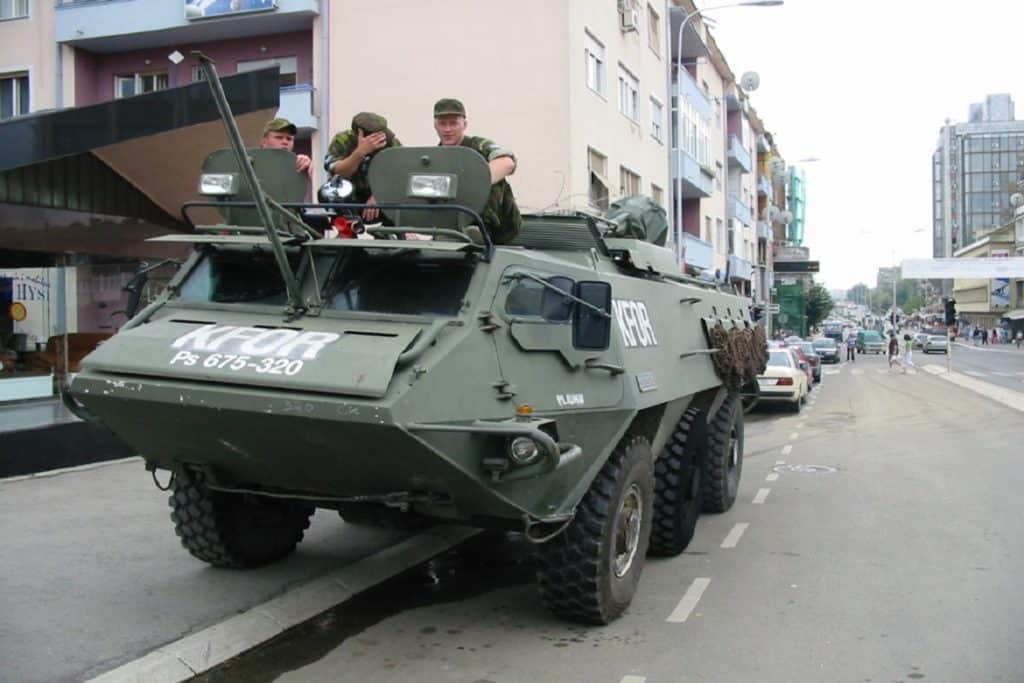The Balkans represents one of the most complex regions in Europe. Moreover, this small peninsula has always been the main battlefield for many disputes.
The numerous wars and ethnic conflicts throughout the years did not solve anything. Moreover, those crisis generated further conflicts and divide.
Additionally, the influence and the geopolitical interests of the global powers just fueled additional challenges for the Balkan nations. One of those issues is the dispute between the self-proclaimed state of Kosovo and Serbia.
The NATO Intervention in 1999
Over the years the Albanians became the majority in Kosovo. Also, their ambitions for a Greater Albania were back on the agenda. On the other side, the Serbian side aimed to maintain control of its southern province. The bloody conflict ended with a NATO intervention which saw Serbia pulling out of Kosovo. Based on the UN resolution 1244, Kosovo was still part of Serbia but under temporary UN peacekeeping force.
However, the newly formed Albanian authority declared independence in February 2008. The self-proclaimed republic was recognized by the United States and most of its allies. Moreover, the American side and NATO still maintains a strong military presence in Kosovo. From a regional geopolitical aspect, the American Bondsteel Camp base has the role to deter any possible Serbian armed campaign. Therefore, the American and NATO presence has a direct impact on keeping this as a frozen conflict.
The Russian Federation and China are strongly opposing so-called independent Kosovo. Moreover, their stance is blocking Kosovo to join the UN. The response of these two global players is based on their strategic interest in combating the American Hegemony. Therefore, this Balkan issue is where the global powers interests collide.
These two stances proved to be the main element that maintains the status quo in this fragile area.
The Serbian and Kosovo Albanian Approach
The Serbian side does not accept the independence of Kosovo. Therefore, this Balkan country has actively used various diplomatic measures. By blocking Kosovo from joining the UN, Interpol and other organizations, official Belgrade aims to force the Albanian side to negotiate. Moreover, the Serbian foreign ministry has actively worked with countries to cancel the recognition of Kosovo.
These activities may go well with the Serbian plan. But, if we look from a geopolitical aspect, the tensions are higher than ever. The Kosovo side responded with creating its own army and enforcing 100% tariffs for Serbian products coming to Kosovo. These two strategies significantly derailed the European Union and US ambitions to find a solution through negotiation.
Nevertheless, it seems that both sides have at least basic agreement about a potential solution. Moreover, the idea of border correction between the sides is seriously considered. Also, it seems that the current Trump administration favours this outcome.
This thesis is supported by the statement by the letter of President Trump to Hashim Thaci and Aleksandar Vucis. The president called both presidents to be brave to find a final solution.
According to many unofficial sources, the plan will see Serbia taking back Northern Kosovo. This is based on the fact that this region is dominated by ethnic Serbs. While the Kosovo side will incorporate the Presevo Valley(a region in South Serbia dominated by ethnic Albanians).
The Domino Effect
This solution may seem the most pragmatic and simple. However, it is important to emphasize that this can have more broad consequences.
The first and foremost, it will create internal conflict in Serbia and Albanian dominated Kosovo. This is based on the fact that the majority of the people on both sides are against this scenario. Therefore, this can actually create internal security and political complications for both sides.
The second element that we will analyze is the impact on the Balkan region. The potential territory exchange can open up the Balkan Pandora Box.
The first problem of this outcome might be seen in Macedonia and Montenegro. Both former Yugoslav Republics have a significant Albanian Minority. Moreover, Macedonia had an armed conflict in 2001 with the Albanian Separatists.
Also, this can undermine the Daytona Agreement and shake the stability of Bosnia. The Republic of Srpska, (a Serbian dominated entity within Bosnia) may look for independence or to join Serbia. Also, the Croatian dominated cantons may seek to join Croatia
The potential domino effect on Bosnian should not be undermined. The internal civil war in the ’90s resulted with more than 200 000 deaths. The most bloody conflict in Europe since World War II.
Also, there is a significant Albanian presence in Northwest Greece which can cause tensions between Albania and Greece.
Therefore, the potential territory exchange between Serbia and Kosovo could generate a broader regional conflict.
Additionally, this potential peace solution can create problems on international levels. This is based on the fact that every potential border change can have a global effect. It can encourage many separatists and pro-independence movement to implement their objectives.
Conclusion
we can conclude that the Kosovo issue can have a significant impact on the stability of the Balkan Peninsula. Moreover, the involvement of the great powers makes this problem even more complex. However, the US and NATO presence in Kosovo is the main factor that prevents an armed conflict. Therefore, we should not undermine the potential for future conflict between the two sides.
Image Credit: Flickr/RNW







